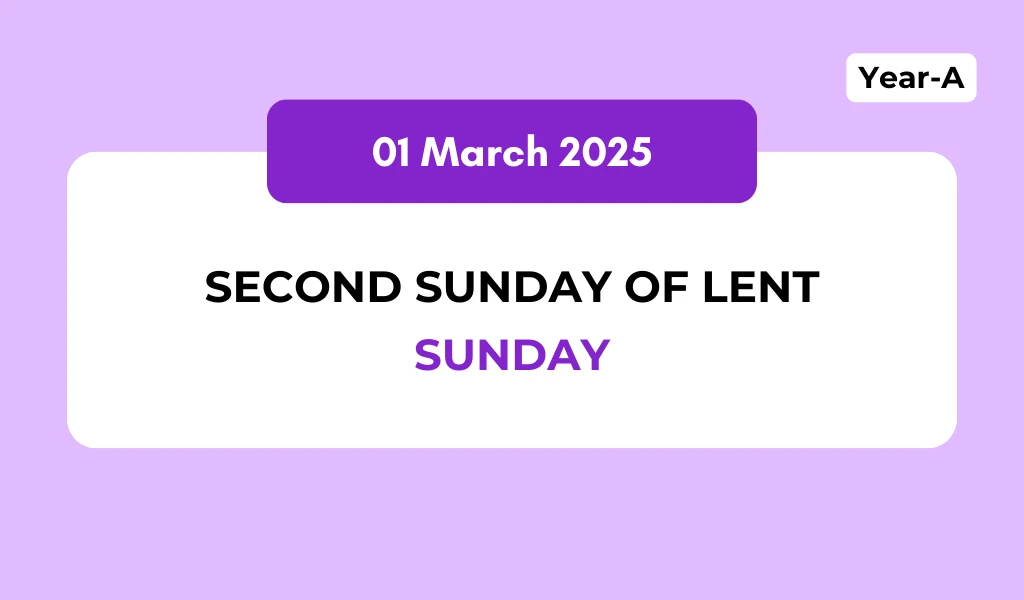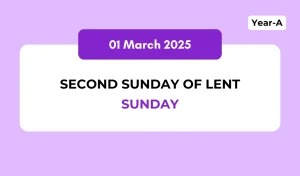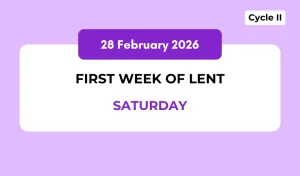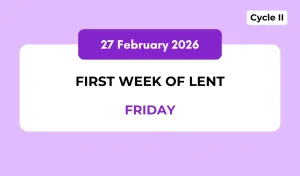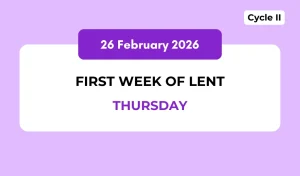Catholic Mass Readings and Reflection August 13, 2025
Wednesday – 19th Week in Ordinary Time
13th August 2025 (Wednesday)
Psalter: Week 3
Readings of the Day
First Reading: Deuteronomy 34:1-12
In those days: Moses went up from the plains of Moab to Mount Nebo, to the top of Pisgah, which is opposite Jericho. And the Lord showed him all the land, Gilead as far as Dan, all Naphtali, the land of Ephraim and Manasseh, all the land of Judah as far as the western sea, the Negeb, and the Plain, that is, the Valley of Jericho the city of palm trees, as far as Zoar. And the Lord said to him, “This is the land of which I swore to Abraham, to Isaac, and to Jacob, ‘I will give it to your offspring.’ I have let you see it with your eyes, but you shall not go over there.” So Moses the servant of the Lord died there in the land of Moab, according to the word of the Lord, and he buried him in the valley in the land of Moab opposite Beth-peor; but no one knows the place of his burial to this day. Moses was one hundred twenty years old when he died. His eye was undimmed, and his vigour unabated. And the people of Israel wept for Moses in the plains of Moab for thirty days. Then the days of weeping and mourning for Moses were ended. And Joshua the son of Nun was full of the spirit of wisdom, for Moses had laid his hands on him. So the people of Israel obeyed him and did as the Lord had commanded Moses. And there has not arisen a prophet since in Israel like Moses, whom the Lord knew face to face, none like him for all the signs and the wonders that the Lord sent him to do in the land of Egypt, to Pharaoh and to all his servants and to all his land, and for all the mighty power and all the great deeds of terror that Moses did in the sight of all Israel.
Psalm 66:1-3a 5 and 8, 16-17 (R. see 20a, 9a)
R/. Blest be God, who gave life to my soul.
Gospel Acclamation
V/. Alleluia
R/. Alleluia
V/. In Christ, God was reconciling the world to himself, and entrusting to us the message of reconciliation.
R/. Alleluia
Gospel: Matthew 18:15-20
At that time: Jesus said to his disciples, “If your brother sins against you, go and tell him his fault, between you and him alone. If he listens to you, you have gained your brother. But if he does not listen, take one or two others along with you, that every charge may be established by the evidence of two or three witnesses. If he refuses to listen to them, tell it to the church. And if he refuses to listen even to the church, let him be to you as a Gentile and a tax collector. Truly, I say to you, whatever you bind on earth shall be bound in heaven, and whatever you loose on earth shall be loosed in heaven. Again I say to you, if two of you agree on earth about anything they ask, it will be done for them by my Father in heaven. For where two or three are gathered in my name, there am I among them.”
Daily Gospel Reflection
Wednesday – 19th Week in Ordinary Time
Main Point: In a world that is like a battlefield, the solution is not grudge and resentment, or blame and slander, or aggression and retaliation, but forbearance and reconciliation
Guideline: In a world that is like a battlefield, the solution is not grudge and resentment, or blame and slander, or aggression and retaliation, but forbearance and reconciliation
1. The world of today is in a whirlwind of condemnation and calumny, revenge and retaliation. A good number find a vain pleasure in passing judgments on others and condemning them in public. Many harbour a lot of negativity inside and wait eagerly to retort and retaliate.
2. In such a context, today the Lord is inviting us in the gospel for a spirit of fraternal correction, reconciliation, and restoration of the lost link. When someone wrongs, we should not rush to condemn and put them in public disgrace.
3. Rather, we should patiently try to make him realise his faults and win him back. A deep-seated Fraternity should guide us in a process of personal approach, dialogue and persuasion. This is done gradationally, first through a personal confrontation, then with the help of one or two witnesses, and then by the intervention of the church.
4. However, if all these efforts fail, then the next step is dissociation, a distancing from him as a pagan, as an alien, and rival to God. It is in this context comes the importance of community agreement, prayer intimacy and intercession, and the sacrament of reconciliation.
5. That is why Jesus says, “If two of you agree about anything they ask, it will be done for them by my Father”; “Where two or three are gathered in my name, there am I in the midst of them”.
6. Also, the mention of Moses in the first reading of Deuteronomy 34. 1-12 as a singular prophet whom the Lord knew face-to-face and who was a mighty instrument for God’s mighty power, may point to the aspect of intimacy and power of prayer.
7. The words of Jesus, “Whatever you bind on earth shall be bound in heaven, and whatever you loose on earth shall be loosed in heaven”, in a general tone, can indicate a spirit of reconciliation. This may imply that we should not retain or reserve any grudge but should be free and relieved.
8. However, usually, this statement refers to the sacrament of reconciliation, and it is valid as well. For it is in this holy and renowned sacrament that we are at the doors of abundant streams of mercy and reconciliation with God and with others. It is so sad that today, many fail to recognise the immense value of this great sacrament.
My Practice: Many claim to be intelligent and very judicious. But is it not foolishness to throw away the sacrament of reconciliation, which is the fount of mercy and conciliation?

